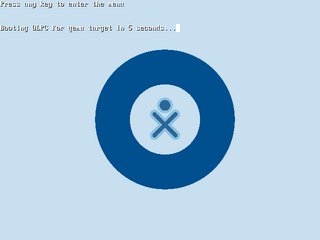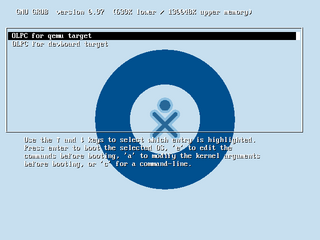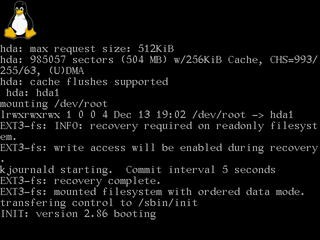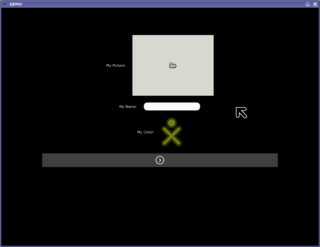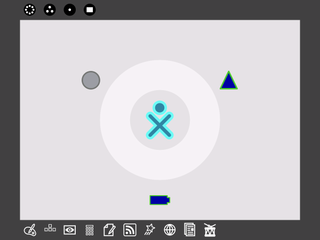Sugar Instructions/lang-ja: Difference between revisions
m (→ホームモード) |
|||
| Line 79: | Line 79: | ||
{{anchor|Home Mode }} |
{{anchor|Home Mode }} |
||
=== ホームモード === |
=== ホームモード === |
||
[[Image:Empty_no_apps_no_frame.png|right|thumb|320px| ホームモード。最初に立ち上げたときにどのように画面が見えるかを示しています。]] |
|||
Sugarデスクトップはホームモードで立ち上がります。この画面の真ん中にはあなたとあなたのラップトップをあらわすXOのアイコンが表示されます。そのまわりにあるのはリングです。 |
|||
続けていくと、多くの友達が見えるでしょう。しかし現在のところはあなただけが見えます。個々の友達はそれぞれ別の色を持っています。 |
|||
外側のリングに沿って、いささかランダムにアイコンが配置されています:バッテリー、三角形、そして/あるいは円。バッテリーアイコンはバッテリーの電池がどれだけ残っているかを示します。(色数が少ない=電池が少ない)無線アクセスポイントにつながっている時は、三角が現れます。無線メッシュにつながっている時は円が現れます。(あるいはその他にもいろいろと。これらについてはここでは説明しません。) |
|||
<br clear="all"/> <!--prevents image pushing title out--> |
|||
{{Translated text| |
{{Translated text| |
||
[[Image:Empty_no_apps_no_frame.png|right|thumb|320px| Home Mode. This is how the screen will look when you first start up.]] |
[[Image:Empty_no_apps_no_frame.png|right|thumb|320px| Home Mode. This is how the screen will look when you first start up.]] |
||
| Line 89: | Line 98: | ||
<br clear="all"/> <!--prevents image pushing title out--> |
<br clear="all"/> <!--prevents image pushing title out--> |
||
|display = |
|display = none}} |
||
{{anchor|The Frame Is How You Control Sugar }} |
{{anchor|The Frame Is How You Control Sugar }} |
||
=== フレームはSugarをコントロールするためのもの === |
=== フレームはSugarをコントロールするためのもの === |
||
{{Translated text| |
{{Translated text| |
||
Revision as of 04:55, 29 August 2007
- This is an on-going translation
バージョンの違うSugarは動作も違う!
Sugarソフトウェアは急速に進化しています。なのであなたが手に入れたバージョンによって異なる説明があります。OLPCのソフトウェアは"ビルド"にて配布されます。ビルドはラップトップのファームウェアにロードされている(あるいはCDイメージ、USBメモリスティック、あるいはSDカードから起動される)ものです。このページは現在の安定ビルド(Build 385)のSugarのバージョンについてかかれたものです。他のバージョンの全てのドキュメントは[Category:Sugar]にあります。
インストール
もしあなたがOLPCのラップトップを持っているならば、Sugarはすでにインストールされています。 そうでなければSugarの組み込まれたラップトップのエミュレータを使うか、あるいはあなたのPCにPythonをインストールし(個々のプラットフォームごとの説明はCategory:Installing Sugarをご覧下さい)、そしてSugarアプリケーションをあなたのPCで直接走らせることができます。
もしあなたがPythonからSugarを走らせているなら、あなたの名前を選ぶ項目のところまで次章の殆どの内容をスキップして構いません。
OLPCラップトップエミュレーション環境での最初の起動
エミュレータを使ってあなたが最初にOLPCイメージを開くと、まずこの画面を見ることになります。とりあえずエンターキーを押すか、数秒待ってください。
このスクリーンが現れるでしょう。エミュレータを使っている場合はもう一度エンターキーを押してください。
すると複数のテキストスクリーンが、Linuxがロードを実行している間表示されては消えていくはずです。Sugarデスクトップがその後表示されるまでひたすら待ちましょう。
そしてログインプロンプトが現れます。特に何もタイプする必要はありません。待っているとGUIが開始されるはずです。GUIがロードされるのを待ちたくないときは、"root"というユーザ名とパスワードは無しでログインすることができます。
待っているとGUIがスタートします。もしGUIのスタートに失敗したときは、あなたがブートしたときにエミュレートモードの選択を忘れているか、あるいは"GUIがスタートしない"バグにぶち当たったのかもしれません。"GUIがスタートしない"バグはハードディスクイメージを再インストールすると解消されます。(あるいはイメージファイルのバグによるものかもしれません。http://dev.laptop.org/ticket/1295 をご覧下さい。)QEMUの場合は、.imgファイルを削除してください。(.imgファイルが壊れてしまっています)そしてbz2ファイルからオリジナルの.imgファイルを取り出し、あるいはイメージファイルを再度ダウンロードしてください。最新版にアップグレードする必要はありません。
名前と色を選ぶ
最初にSugarがスタートしたとき、ユーザネームの入力とアイコンの色を選ぶようスクリーンが表示されるはずです。(303以前のいくつかのビルドでは、絵を選択する必要もあります。)ユーザ名を入力してください。;現在のところここで入力する名前はたまに使われるくらいです。あなたのラップトップと、同じネットワークにいるその他のXOの、メッシュビューでのあなたのアイコン表示にカーソルを合わせたときに表示されます。
以前はアイコンの色はランダムに選択されるようになっています。あなたはそれらの色をXOアイコンをクリックすることで変更できます。:あなたの気に入る色の組み合わせになるまでクリックし続けてください。(最新のビルドでは対話的に選択できるようになっています)エンターを押すか、あるいは">"を押して続けてください。
Sugarデスクトップを使ってみよう
ホームモード
Sugarデスクトップはホームモードで立ち上がります。この画面の真ん中にはあなたとあなたのラップトップをあらわすXOのアイコンが表示されます。そのまわりにあるのはリングです。
続けていくと、多くの友達が見えるでしょう。しかし現在のところはあなただけが見えます。個々の友達はそれぞれ別の色を持っています。
外側のリングに沿って、いささかランダムにアイコンが配置されています:バッテリー、三角形、そして/あるいは円。バッテリーアイコンはバッテリーの電池がどれだけ残っているかを示します。(色数が少ない=電池が少ない)無線アクセスポイントにつながっている時は、三角が現れます。無線メッシュにつながっている時は円が現れます。(あるいはその他にもいろいろと。これらについてはここでは説明しません。)
フレームはSugarをコントロールするためのもの
The "Frame", a black border around the edge of the screen, is where many of Sugar's controls are. The frame can appear and disappear, making more room on the screen for activities. It is usually visible on the main screen with the ring, since the edges of that screen aren't used for anything else. If it is not visible, move your mouse pointer to a corner of the screen. The Frame will appear, and will stay visible as long as the mouse pointer doesn't leave the frame area for more than about half a second at a time.
You can also make the Frame appear or disapper by pressing the upper rightmost key on the OLPC keyboard (it has a rectangle on it, like a picture frame).
アクティビティを開く
ビューモードを切り替える
別のアクティビティに切り替える
アクティビティを閉じる、共有する
インターネットアクセス
ウェブブラウザ
ターミナル、シェル、あるいはLinuxプロンプト
You can access a shell in two ways... Either hold down Ctrl+Alt+F1 to leave the Sugar screen and return to the text console's login prompt, or open the Developer Console activity within Sugar and select the terminal tab.
If you use Ctrl+Alt+F1 to leave Sugar, you can return to Sugar with Ctrl+Alt+F3.
If you use the terminal in the Developer Console you won't be logged in as "root" but as "olpc". You need to be logged in as "root" to edit some of the setup files, such as "/boot/grub/grub.conf". You can gain root access by typing "su -". The prompt suffix will change to # which denotes that you are root. You will not be able to start any graphical programs as root using this method.
For example, if you want to edit "/boot/grub/grub.conf" with Write in Sugar, hold down Ctrl+Alt+F1 to leave Sugar, and type "root" for the log in. Type "chmod a+rw /boot/grub/grub.conf". Then return to Sugar by holding down Ctrl+Alt+F3. Now you can open and save that file in Write. However, for system control files, using "vi" in a terminal window is a much better choice than Write.
Some basic shell commands you can use at the prompt are:
- ls -al (get a list of the files)
- cd dirname (change to directory dirname)
- cat filename (show the contents of filename)
お友達ビューモード
ショートカットキー
システムをシャットダウンする
{{Translated text| To shut down the whole system, simply push the power button on the bezel; it's below the lower right corner of the screen. This currently only works when the screen is showing graphics (as it is now). The system should leap to action immediately, and turn itself off within half a minute or so. If this doesn't happen, you can also force a power-off by pressing and holding the power button for many seconds.
Sugarで利用可能なアクティビティ
This list provides more information about the activities available or under development.
Under the Hood
Sugarインタフェースについての詳細な説明
For more info on the Sugar interface, have a look at the Human User Interface Guidelines.
